After winning four gold medals at the 1936 Olympic Games in Berlin and upending Hitler's ideas about Aryan supremacy, Jesse Owens became one of the most legendary athletes in history.
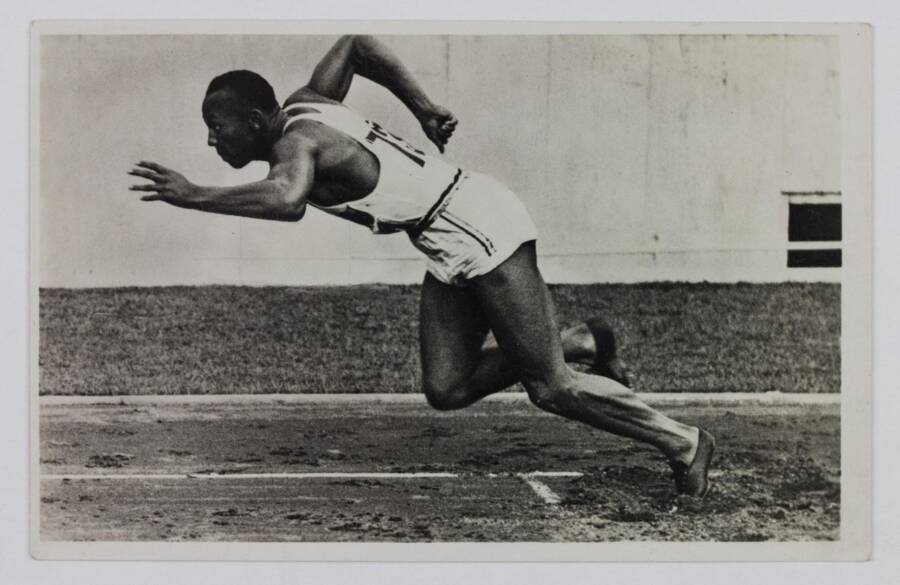
N.N./Wikimedia CommonsJesse Owens won four gold medals at the 1936 Olympics in Berlin, Germany.
In 1936, Nazi Germany invited the world to Berlin for the Olympic Games. The Nazis hoped to legitimize their regime and showcase the athletic prowess of the Aryan “master race.” But at the 1936 Olympics, Jesse Owens — a Black American track star — blew the Nazis’ plans out of the water.
Not only did Owens out-perform German athletes during the 1936 Olympics, but he also became the first American track and field athlete to win four gold medals at a single Olympic Games. Owens triumphed in the 100-meter run, the 200-meter run, the long jump, and the 4×100-meter relay.
On just the second day of the competition, Nazi propaganda minister Joseph Goebbels angrily wrote in his diary, “We Germans won a gold medal, the Americans three, of which two were Negroes. That is a disgrace. White people should be ashamed of themselves.”
This is the story of Jesse Owens and the 1936 Olympics.
Jesse Owens’ Path To The Olympics
Born to a sharecropping family on September 12, 1913, in Oakville, Alabama, James Cleveland Owens demonstrated his ability as a track star at a young age. After he and his family moved to Cleveland in 1922 — where his nickname “J.C.” became “Jesse” — Owens started setting records at Fairmount Junior High School. According to Case Western Reserve University, Owens ran the 100-yard dash in just 11 seconds. And before long, he had set school records in the high jump and the long jump as well.
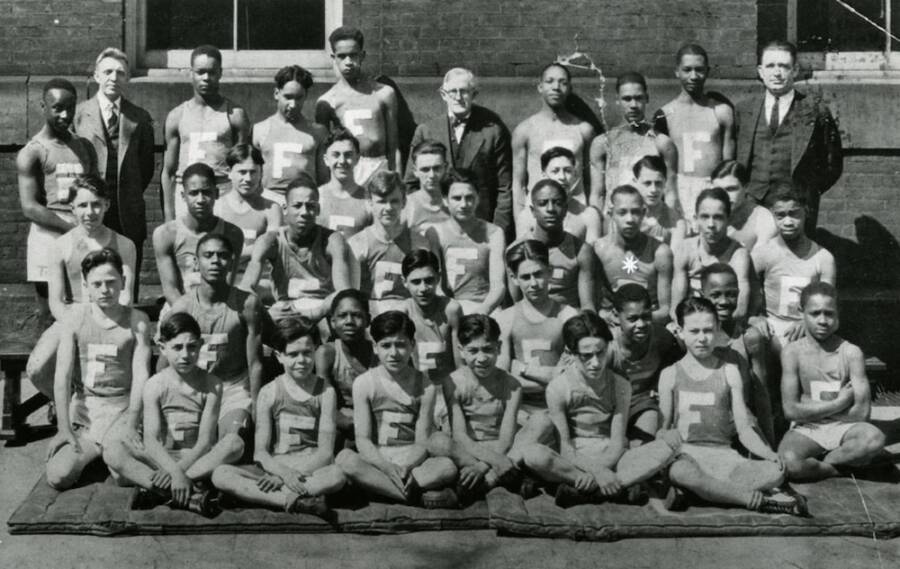
The Ohio State University ArchivesJesse Owens, in the third row with an asterisk on his jersey, started setting track records in junior high school.
From there, Owens enjoyed a meteoric rise. In 1933, he won three events at the National Interscholastic Championships. In 1935, he competed for Ohio State University (Columbus) in a Western Conference track and field meet, where he matched the world record for the 100-yard dash and broke world records for the 220-yard dash, the 220-yard low hurdles, and the long jump.
Then, in 1936, Jesse Owens and 311 other American athletes prepared to travel to Berlin, Germany for the Olympics. That year, the games would take place under the shadow of the horrific Nazi regime.
The Controversy Over The 1936 Olympic Games
Uncertainty about the 1936 Olympics raged on both sides of the Atlantic Ocean. The International Olympic Committee had awarded the 1936 Summer Olympics to Berlin back in 1931 as an acknowledgement of Germany’s return to the international community after World War I, but Adolf Hitler — who’d come to power in 1933 — was unsure about hosting the games.
Hitler saw little value in the Olympics and their embrace of internationalism, but the Nazi propaganda minister, Joseph Goebbels, convinced him of their value. Goebbels argued that the games could advance the Nazi cause and showcase Aryans as the true “master race.” Indeed, the international spectacle of the Olympics would, in many ways, legitimize the Nazis.
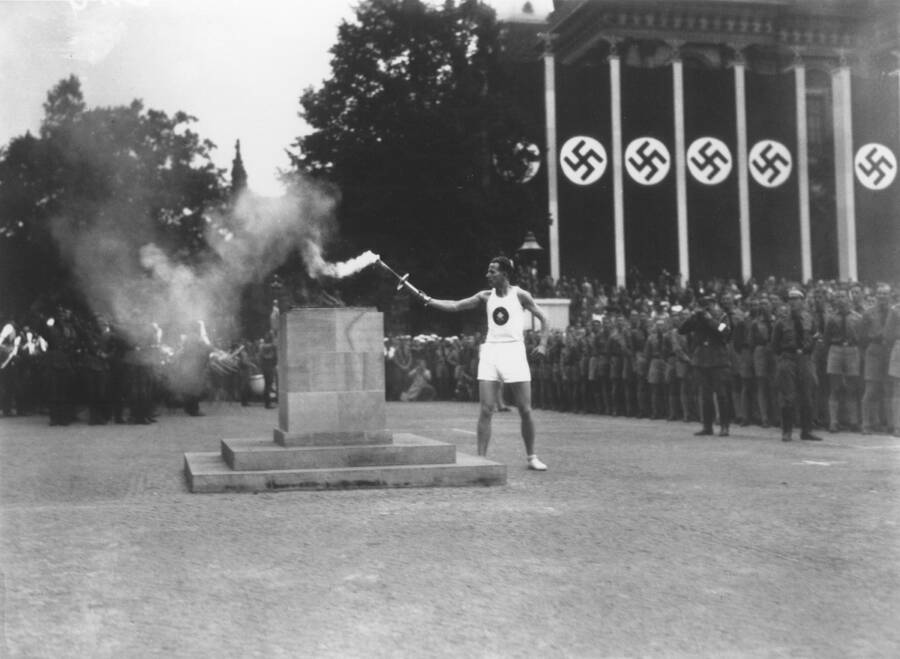
National Archives and Records AdministrationThe lighting of the Olympic flame at the 1936 Olympics.
Meanwhile, a number of countries weighed boycotting the 1936 Olympic Games. The international community was aware of the Nazi regime’s growing discrimination against Jews, which extended to the world of sports. But even though the American Olympic Committee’s president, Avery Brundage, initially expressed support for a boycott, he changed his mind after the Nazis invited him to tour Berlin’s newly constructed sports complex.
According to a Washington Post report from 1996, the Nazis also promised Brundage that 23 Jewish athletes would be invited to the Olympic training center. In fact, only one Jewish athlete, Helene Mayer, was allowed to compete for Nazi Germany during the Olympic Games, and that was only because the Nazis said that she had two “Aryan” grandparents.
It was under this dark cloud of antisemitism and racism that the story of Jesse Owens and the 1936 Olympics truly began.
Jesse Owens And The 1936 Olympics
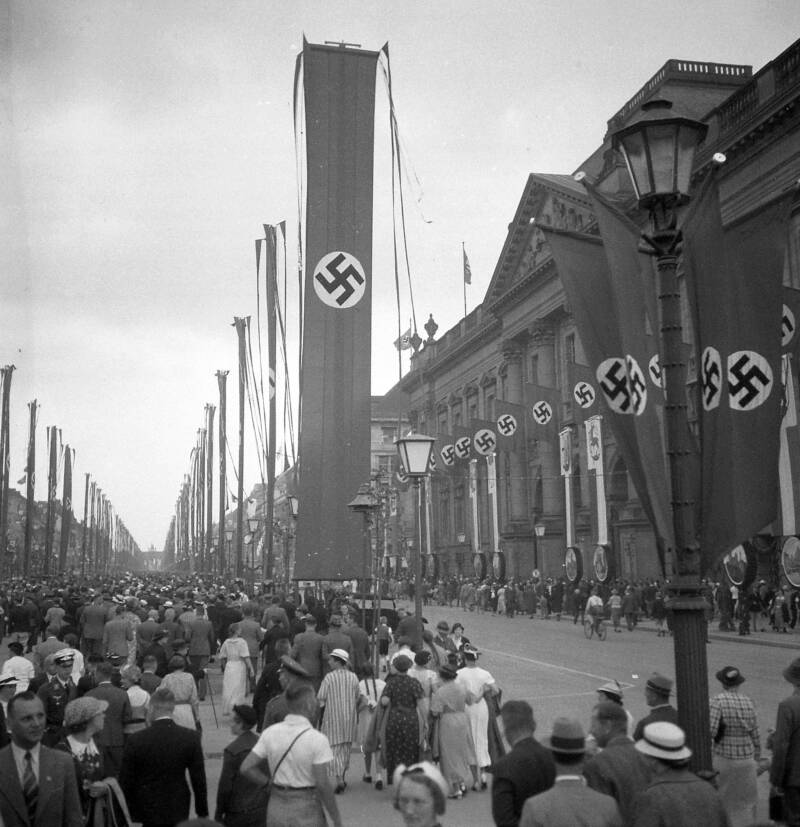
FOTO:FORTEPAN/Lőrincze Judit/Wikimedia CommonsNazi flags in Berlin during the 1936 Olympics.
As tourists and athletes from around the world poured into Berlin in the summer of 1936, they saw a city full of Olympic flags and swastikas. They didn’t see anti-Jewish signs, which the Nazis had removed ahead of the Olympics, according to the United States Holocaust Memorial Museum.
On August 1st, the 1936 Olympic Games began to great fanfare in Berlin. And just a few days later, Jesse Owens would prove the hollowness of the Nazis’ racist mythology about Aryan supremacy.
On August 3rd, Jesse Owens raced to gold in the 100-meter dash. On August 4th, he defeated German champion Luz Long in the long jump (and later ended up forming an unlikely friendship with Long, who proudly walked arm-in-arm with Owens around the stadium and posed for several pictures with him). On August 5th, Owens won the 200-meter run, and then on August 9th, he nabbed his fourth gold medal in the 4×100-meter relay.
His fourth win was bittersweet, however, as he knew that he and another Black athlete were replacing two Jewish athletes who were supposed to run in that race. Owens initially tried to protest this last-minute switch, but he was berated by his coach, who ordered him to run: “You’ll do as you’re told.”
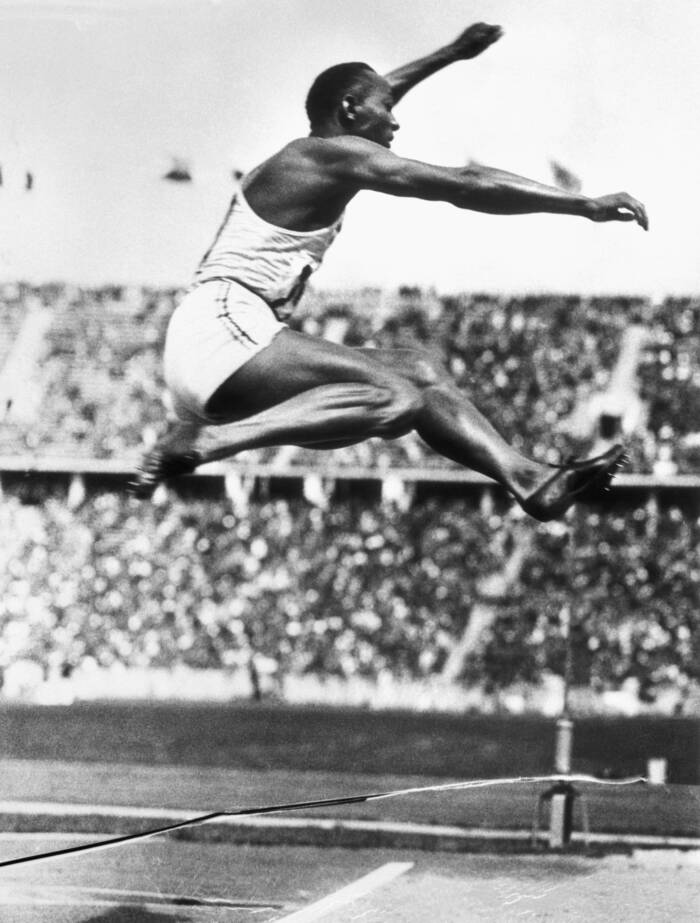
German Federal ArchivesAt the 1936 Olympics, Jesse Owens defeated his German competitor during the long jump — and later befriended him.
Despite his conflicted feelings about his last win, Jesse Owens became the first American track and field athlete to win four gold medals in a single Olympics, a record that would stand until 1984. And his victories stood in the face of the smug Nazi sentiment about Aryan racial superiority.
In fact, rumors quickly spread that Hitler had deliberately snubbed Jesse Owens by refusing to shake his hand after his victories. The truth was that Hitler had not publicly congratulated any athletes after the first day of the competition, when he was requested to treat competitors equally.
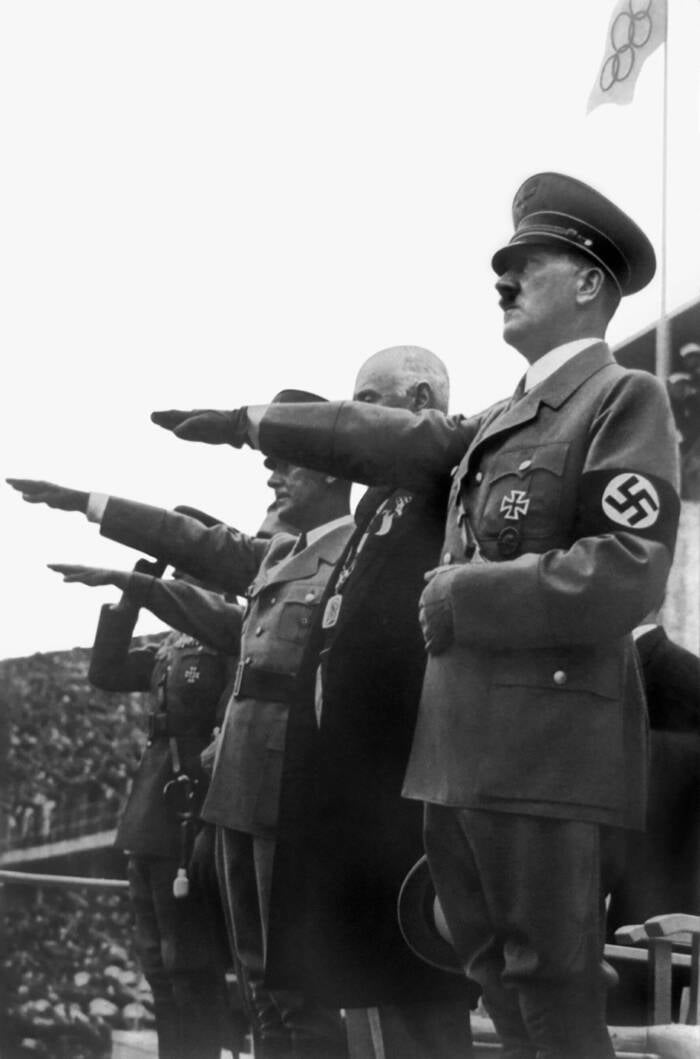
Alpha Historica/Alamy Stock PhotoAdolf Hitler at the 1936 Olympics. Rumors spread that he’d snubbed Jesse Owens, though this appeared to be untrue.
Goebbels, however, was outraged. In his newspaper, Der Angriff (“The Attack”), he bitingly suggested that the Americans would not have even made it to the games without their “black auxiliaries” and that “the world would have described the Yankees as a great disappointment.”
At the 1936 Olympic Games, Jesse Owens made his mark on history. But he could not change the trajectory of Nazi Germany. And ultimately, the Olympics could not change his personal trajectory, either.
“I Couldn’t Ride In The Front Of The Bus”
Though Jesse Owens was the most successful individual athlete of the 1936 Olympics, Germany ultimately won the most total medals. And the Olympics had succeeded in legitimizing the Nazi regime. In the aftermath, The New York Times reported that the games had humanized Germans and that, after World War I, Germany was “back in the fold of nations.”
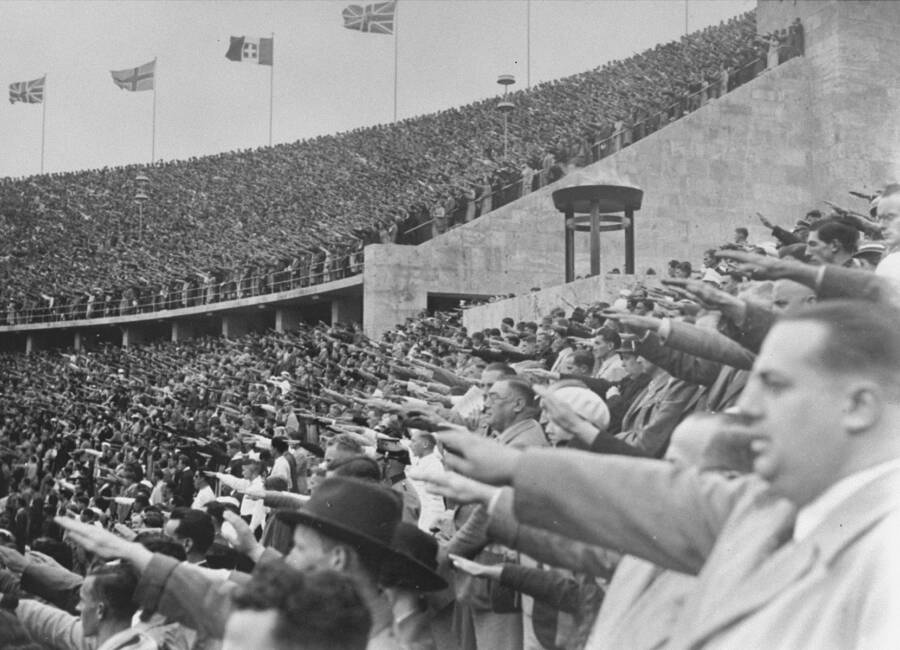
National Archives and Records AdministrationThe crowd saluting Adolf Hitler at the opening of the 1936 Olympics.
But the Nazis’ persecution of Jews picked up as soon as the international tourists and athletes had gone home. In fact, just two days after the Olympics ended, the head of the Olympic Village died by suicide after being dismissed from the military on account of his Jewish heritage.
Almost exactly three years later, World War II would officially begin in 1939 with the Nazi invasion of Poland.
Meanwhile, Jesse Owens found that his place in American society hadn’t changed much, despite his incredible performance at the Olympics. Though he had made the nation proud, U.S. President Franklin D. Roosevelt failed to meet with Owens and congratulate him for winning four gold medals.
“When I came back to my native country, after all the stories about Hitler, I couldn’t ride in the front of the bus,” Jesse Owens remarked about his treatment after the Olympics. “I had to go to the back door. I couldn’t live where I wanted. I wasn’t invited to shake hands with Hitler, but I wasn’t invited to the White House to shake hands with the president, either.”
And when Owens heard about rumors that Hitler had snubbed him at the Olympics, he said, “Hitler didn’t snub me — it was our president who snubbed me… The president didn’t even send me a telegram.”
In the aftermath of the 1936 Olympics, Jesse Owens struggled to find his place. He withdrew from university and worked odd jobs as his fame diminished. He raced against horses and opened up a dry cleaning business, but later wrote books, traveled the world as a goodwill ambassador, and served as secretary of the Illinois State Athletic Commission.
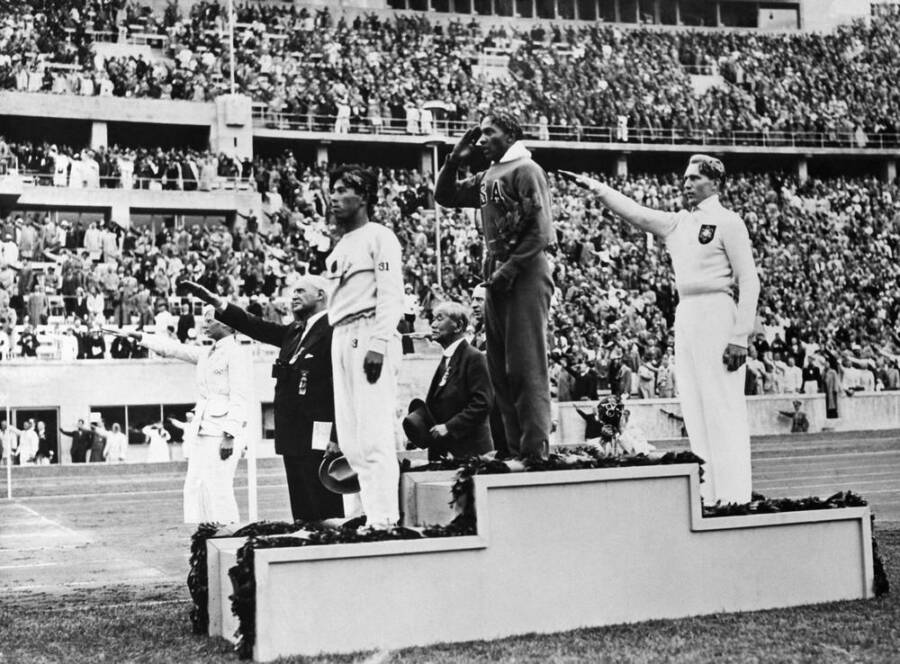
German Federal ArchivesJesse Owens salutes the American flag at the 1936 Olympics after winning the long jump.
In 1976 — long after the Nazi regime had fallen — Jesse Owens received his long-awaited congratulations from a president. Then, President Gerald R. Ford awarded Owens the Presidential Medal of Freedom.
“In 1936, when Adolf Hitler was trying to turn the games into a spectacle that would glorify racist dogma of the Nazi state, there was a strong movement in the United States against our participation in the games,” Ford said.
“As it turned out, U.S. participation in those Olympics provided a sharp rebuke of Hitler’s racist rubbish. Five Black American athletes won eight gold medals in track and field. One American athlete in particular proved that excellence knows no racial or political limits. That man is Jesse Owens.”
Owens died on March 31, 1980 at age 66 due to lung cancer. But his legacy as an athlete lives on. Under the shadow of the Nazi regime, he proved that their policies were exactly what Ford said — rubbish. Beneath the swastika flags of Nazi Germany, Jesse Owens proved the falseness of Nazi ideology. In one competition after another, the son of sharecroppers raced to gold.
After reading about Jesse Owens and the 1936 Olympics, discover the story of Bessie Coleman, the first Black female pilot in U.S. history. Or, learn about Bass Reeves, the Black Deputy U.S. Marshal who patrolled the Wild West.





